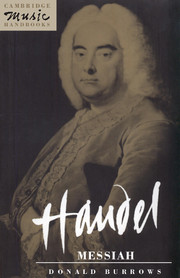Book contents
- Frontmatter
- Contents
- Preface
- References to ‘Messiah’ editions
- 1 The historical background
- 2 From composition to first performance
- 3 The first London performances
- 4 Revival and revision, 1743–1759
- 5 Messiah in other hands
- 6 Design
- 7 Individual movements
- 8 Handel's word-setting
- Appendix 1 The libretto of Messiah
- Appendix 2 Messiah sources
- Notes
- Bibliography
- Index
8 - Handel's word-setting
Published online by Cambridge University Press: 05 June 2012
- Frontmatter
- Contents
- Preface
- References to ‘Messiah’ editions
- 1 The historical background
- 2 From composition to first performance
- 3 The first London performances
- 4 Revival and revision, 1743–1759
- 5 Messiah in other hands
- 6 Design
- 7 Individual movements
- 8 Handel's word-setting
- Appendix 1 The libretto of Messiah
- Appendix 2 Messiah sources
- Notes
- Bibliography
- Index
Summary
Language, like music, communicates through sounds. It is extremely unlikely that Handel would have been insensitive to the intonations and stress patterns of the language of his adopted country in which he had lived for thirty years before composing Messiah. While Handel retained fluency in several languages – Italian, English, German and French – his day-to-day existence in London must have relied principally on communication in English. He may have retained traces of German inflection, but there is no reason to take seriously the caricature of Handel as a composer still acting the linguistic role of a foreigner by 1741. As with his music text, therefore, it is important to distinguish between possible ‘mistakes’ and positive intentions about how he wished the English to be delivered. Allowances must also be made for the possibility of changes in the conventions of pronunciation or stress during the last 250 years.
Handel certainly had some linguistic idiosyncracies. His autograph of Messiah includes characteristic spellings such as ‘strenght’ and ‘trone’, and a consistent use of ‘death’ for ‘dead’. On some occasions his verbal consistency lapsed: in ‘He trusted in God’, for example, he wrote ‘he might deliver him’ twice, and ‘he would deliver him’ once, and he varied between ‘maketh’ and ‘makes’ in ‘If God be for us’. All of these might reasonably be regarded as mistakes, to be edited out with a little common sense and possibly with the arbitration of the printed libretti.
- Type
- Chapter
- Information
- Handel: Messiah , pp. 75 - 82Publisher: Cambridge University PressPrint publication year: 1991

